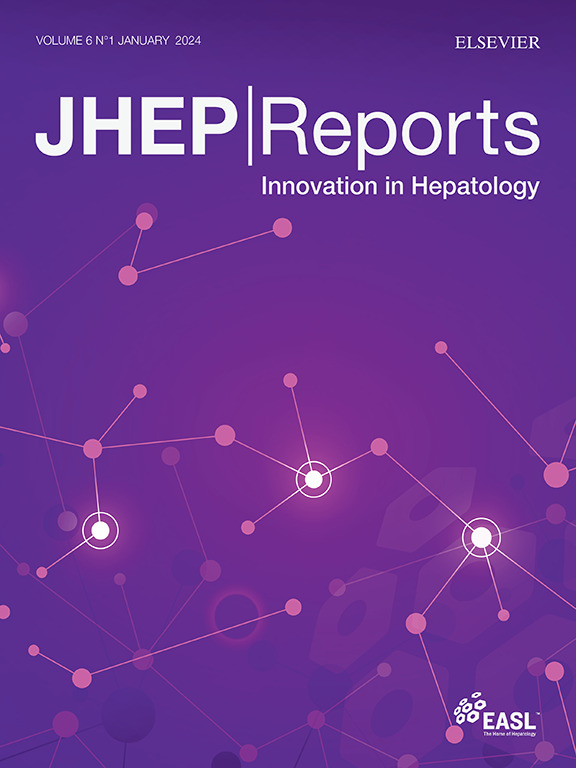Patient-derived organoids inform pharmacogenomic vulnerabilities in liver cancer
IF 7.5
1区 医学
Q1 GASTROENTEROLOGY & HEPATOLOGY
引用次数: 0
Abstract
Background & Aims
Patient-derived tumor organoids (PDTOs) are a reliable model for preclinical and translational studies. Despite positive retrospective correlations with patient response, challenges such as culture success, cost, standardization, and time constraints hinder their clinical utility in precision medicine. Here, we optimize PDTO establishment using growth factor-reduced media (GF-) to mitigate these challenges and (1) identify somatic variant indicators that can improve the therapeutic index of existing FDA-approved drugs against hepatocellular carcinoma (HCC), (2) elucidate synthetic lethal candidates against undruggable HCC driver mutations, and (3) assess the feasibility of PDTOs in personalized therapy.
Methods
We successfully established a panel of 23 PDTOs from patients with HCC undergoing curative hepatectomy using a protocol primarily based on growth factor-reduced medium. PDTOs were subjected to comprehensive analyses, including the identification of hallmark mutations, assessment of genomic heterogeneity, transcriptomic profiling, and histological characterization. A 100-drug repurposing screen was conducted on the PDTOs and organoids derived from adjacent non-tumoral and normal livers to explore tumor-specific drug responses. Pharmacogenomic analysis using elastic net was performed (cut-off p <0.05) and synthetic lethality links were subject to experimental validation. The clinical relevance of PDTOs in personalized therapy were investigated through two case studies.
Results
Our results reveal that GF-derived PDTOs mimic histology and genetic heterogeneity of HCC. Pharmacogenomic analysis showed that the majority of tested FDA-approved drugs were not associated with HCC driver mutations (<5%). In addition, non-canonical signaling from CTNNB1 mutations were associated with ceritinib sensitivity (p <0.0001) via polypharmacological targeting of RPS6KA3. The PDTO case study showed clear benefit to patient survival by aiding clinical management.
Conclusions
Our findings underscore the utility of PDTOs established from minimal GF media in many facets of precision oncology advancements.
Impact and implications
Patient-derived tumor organoids are a reliable model for preclinical and translational studies. Despite positive retrospective correlations with patient response data, challenges such as culture success, cost, standardization, and time constraints hinder their clinical utility in guiding precision medicine. This study underscores the utility of patient-derived organoids established from growth factor-reduced media in many facets of precision oncology, showing for the first time in hepatocellular carcinoma, clear benefit to patient survival in a proof-of-concept case study.

患者来源的类器官提示肝癌的药物基因组脆弱性
背景,aimspatit -derived tumor organoids (PDTOs)是临床前和转化研究的可靠模型。尽管与患者反应呈正相关,但诸如培养成功、成本、标准化和时间限制等挑战阻碍了它们在精准医学中的临床应用。在这里,我们使用生长因子减少培养基(GF-)优化PDTO的建立,以缓解这些挑战,并:(1)确定可以提高现有fda批准的治疗肝细胞癌(HCC)药物治疗指数的体细胞变异指标,(2)阐明针对不可治疗的HCC驱动突变的合成致死候选物,以及(3)评估PDTO在个性化治疗中的可行性。方法我们成功地建立了23例肝细胞癌根治性肝切除术患者的ptos组,使用主要基于生长因子减少培养基的方案。我们对ptos进行了全面的分析,包括标记突变的鉴定、基因组异质性的评估、转录组学分析和组织学表征。对来自邻近非肿瘤和正常肝脏的pdto和类器官进行100种药物再利用筛选,以探索肿瘤特异性药物反应。使用弹性网进行药物基因组学分析(截断p <;0.05),合成致死性联系经过实验验证。通过两个病例研究,探讨PDTOs在个体化治疗中的临床意义。结果我们的研究结果表明,gf来源的pdto模拟HCC的组织学和遗传异质性。药物基因组学分析显示,大多数经fda批准的药物与HCC驱动突变无关(5%)。此外,来自CTNNB1突变的非规范信号通过RPS6KA3的多药理学靶向与ceritinib敏感性相关(p <0.0001)。PDTO病例研究显示通过辅助临床管理对患者生存有明显的益处。结论:我们的研究结果强调了从最小GF培养基中建立的pdto在精确肿瘤学进展的许多方面的应用。影响和启示:空间来源的肿瘤类器官是临床前和转化研究的可靠模型。尽管与患者反应数据具有正的回顾性相关性,但诸如培养成功、成本、标准化和时间限制等挑战阻碍了它们在指导精准医学方面的临床应用。该研究强调了在精确肿瘤学的许多方面,通过减少生长因子的培养基建立的患者来源的类器官的效用,在概念验证案例研究中首次显示,在肝细胞癌中,对患者生存有明显的益处。
本文章由计算机程序翻译,如有差异,请以英文原文为准。
求助全文
约1分钟内获得全文
求助全文
来源期刊

JHEP Reports
GASTROENTEROLOGY & HEPATOLOGY-
CiteScore
12.40
自引率
2.40%
发文量
161
审稿时长
36 days
期刊介绍:
JHEP Reports is an open access journal that is affiliated with the European Association for the Study of the Liver (EASL). It serves as a companion journal to the highly respected Journal of Hepatology.
The primary objective of JHEP Reports is to publish original papers and reviews that contribute to the advancement of knowledge in the field of liver diseases. The journal covers a wide range of topics, including basic, translational, and clinical research. It also focuses on global issues in hepatology, with particular emphasis on areas such as clinical trials, novel diagnostics, precision medicine and therapeutics, cancer research, cellular and molecular studies, artificial intelligence, microbiome research, epidemiology, and cutting-edge technologies.
In summary, JHEP Reports is dedicated to promoting scientific discoveries and innovations in liver diseases through the publication of high-quality research papers and reviews covering various aspects of hepatology.
 求助内容:
求助内容: 应助结果提醒方式:
应助结果提醒方式:


